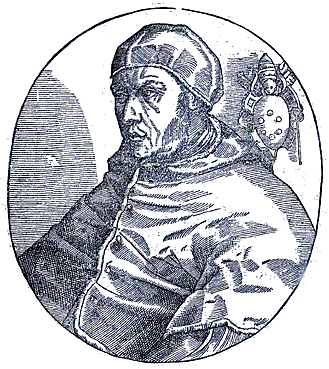
The Impact of Printing
Page 1 of 2
Printing furthered knowledge by making text editions of appropriate design and philological accuracy available at an affordable price.
Humanists welcomed the resultant progress in philology and the possibility printing provided to work with uniform teaching texts. Influential contemporaries praised the fact that now "everyone of moderate means" could participate in learning.
 |
|
Pope Leo X., woodcut 1589
|
The only opposition to be heard came mainly from Church circles which criticized the lack of care in setting the lines of texts and the resulting inferior quality compared to manuscripts. Moreover, the Church feared that the spread of theological learning in the vernacular could result in a loss of power and influence. Pope Leo X tried in a Papal Bull in 1515 to introduce a censorship and a supervision of printed books. This measure had little effect.